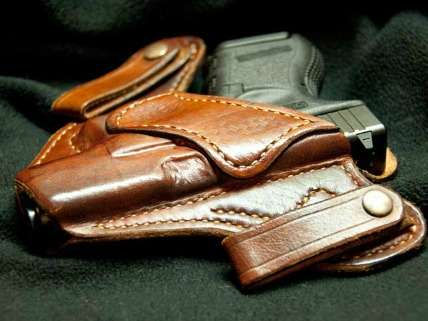Should a 'Potential Criminal Background' Override the Second Amendment?
- OurStudio

- May 4, 2016
- 2 min read

Wikipedia
A New York Times story about state laws loosening restrictions on carrying guns in public quotes Ladd Everitt, spokesman for the Coalition to Stop Gun Violence, who as you might expect does not approve. "What is alarming to the police," he says, "is that they have no power to ascertain the potential criminal background of an armed individual until a crime is committed, and by then it is too late."
That quote directly follows a reference to laws that "eliminate the police's role in issuing permits or questioning people who are openly armed," and it's not clear which change Everitt had in mind. But the phrase "potential criminal background" nicely captures the factors that police can consider when they have broad discretion over who may own or carry guns.
A person's actual criminal background is already a factor in determining who is allowed to own firearms under federal law: Anyone with a felony conviction, even for a nonviolent offense, is disqualified, and so is anyone with a misdemeanor conviction involving domestic violence. By contrast, a person's potential criminal background is a law enforcement official's subjective assessment of his propensity to commit crimes. As far as gun controllers are concerned, it is reckless not to trust police with the discretion to stop possibly dangerous people from arming themselves. After all, once a gun owner actually commits a crime, "it is too late."
This precautionary approach makes perfect sense, as long as you see no practical value in allowing law-abiding citizens to carry guns and no constitutional value in respecting the Second Amendment right to keep and bear arms. The same attitude underlies New York City's gun control laws, which require residents to beg permission not only to carry firearms in public but even to keep them at home or work. A few weeks ago, I noted the arrest of Alex Lichtenstein, a Brooklyn fixer who allegedly helped expedite his clients' pistol permit applications by paying off the cops charged with deciding which New Yorkers deserve to exercise their Second Amendment rights. This week the New York Daily News reported that the NYPD has been seizing guns from Lichtenstein's customers—not because they are dangerous or legally disqualified from owning firearms but simply because they did not undergo the department's "full review," which often takes more than a year and goes well beyond the requirements of federal law.
Aside from rejecting outright bans on handguns, the Supreme Court has not addressed the question of how burdensome firearm regulations can be without violating the Second Amendment. Its answer will depend on who replaces Antonin Scalia on the Court, which will in turn depend on who wins this fall's presidential election. But it is hard to think of any other constitutional right that can be exercised only after a long review by government officials based on imponderables such as the supplicant's future crimes.




Comments